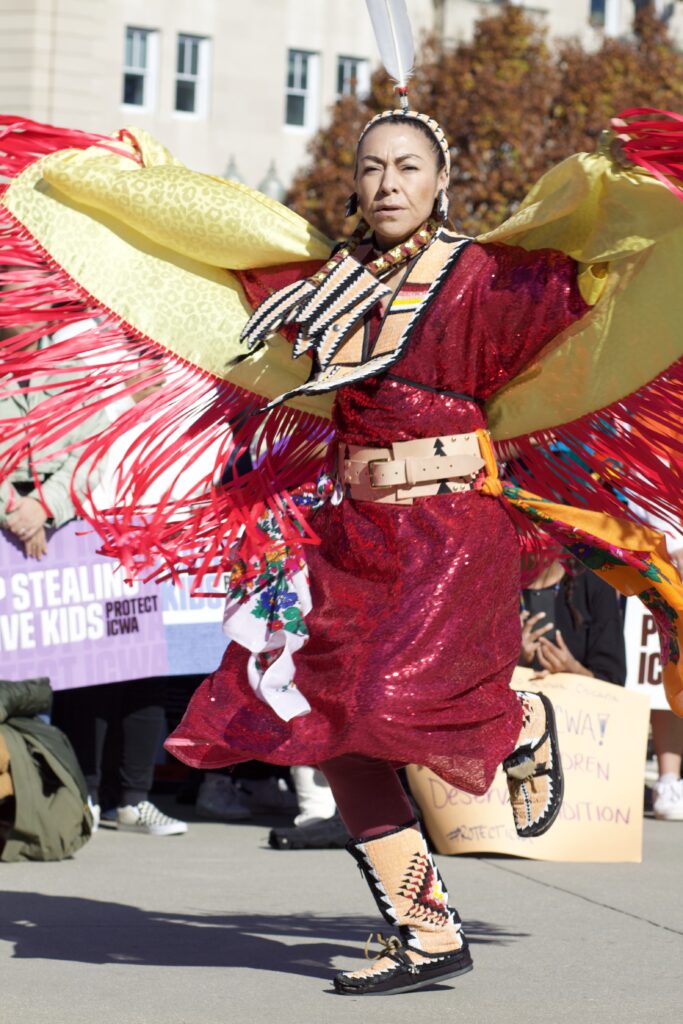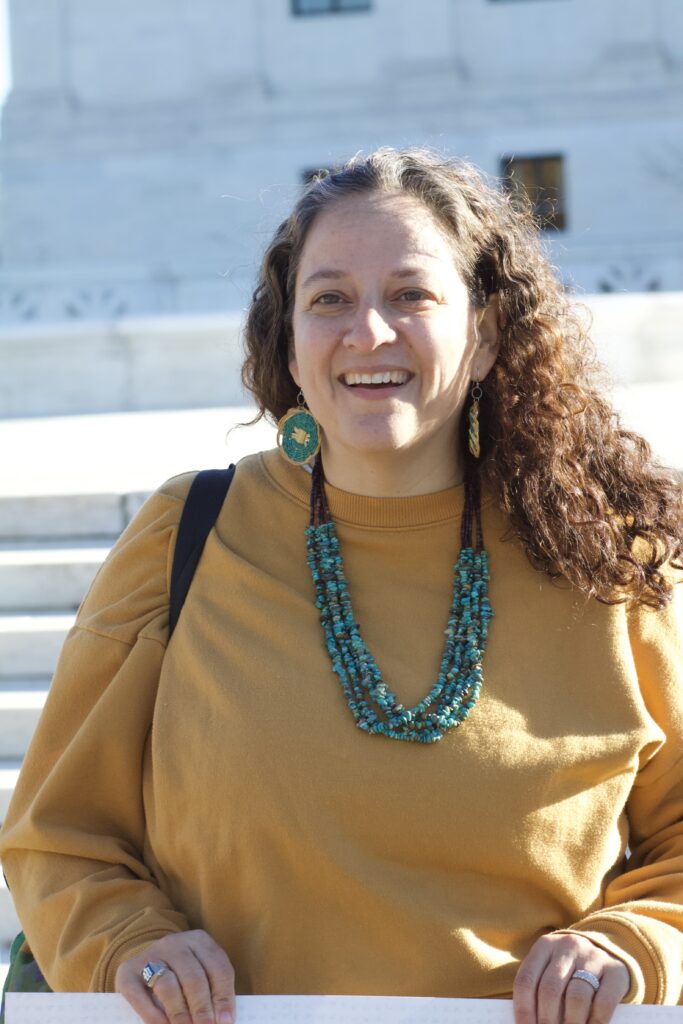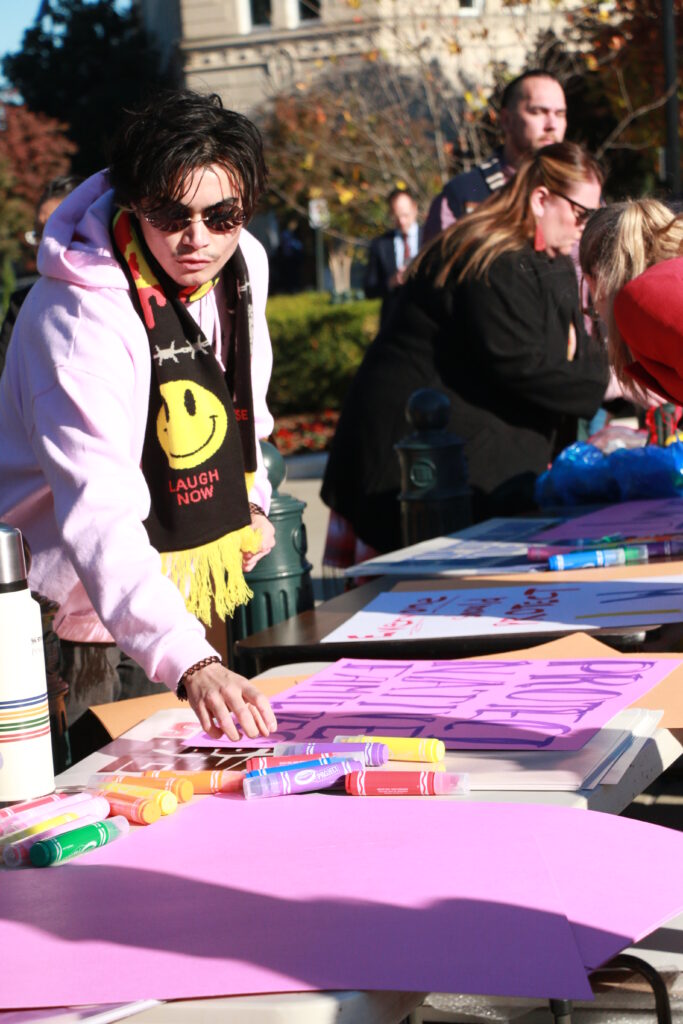In Prayer and Protest, People of Indian Country Gather Outside the Supreme Court to Defend the Indian Child Welfare Act
Nancy Spears
The Imprint

Lycia Maddocks of the National Council for Urban Indian Health stands with other demonstrators in support of ICWA. Photo by Rosemary Stephens. (for fact checking purposes/more info: https://ncuih.org/about/staff/)
An Indigenous dancer from Canada, adopted into a white family along with her eight siblings. The grandson of several “stolen” American Indian generations from Minnesota. A Cherokee attorney from Oklahoma, with her small child in tow.
They joined hundreds of people from across Indian Country who gathered outside the Supreme Court today, vowing to fight for the Indian Child Welfare Act and its 44-year-old protections of the family bonds among tribal members. The law known as ICWA is being challenged in a Supreme Court case, Brackeen v. Haaland, with oral arguments being heard today.
“The only reason why I’m alive today is because ICWA was applied in my case,” said law student Autumn Adams, a member of the Confederated Tribes and Bands of Yakama Nation who grew up in foster care. “I carry it with me every day because that cultural connection I maintain through ICWA is why I stand before you and why I’m as successful as I am.”
The morning began with prayer and singing to the beat of animal-skin drums. The lyrics encouraged the justices and attorneys to “open their hearts and minds” so that they make the right decisions, and to “let the creator join them.”
The high stakes were clear.
“We’re talking about the future of our Native children,” said Misty Flowers, a member of the Santee Sioux Nation of Nebraska and executive director of the Nebraska Indian Child Welfare Coalition. “This gets to be really emotional, because we’re still dealing with the effects of historical trauma.”

In cases involving children who are members of tribes or who are eligible for tribal enrollment, ICWA requires that child welfare agencies make “active,” rather than “reasonable” efforts to keep children with their kin or tribes. It requires qualified experts to testify in abuse and neglect cases, giving tribes the authority to decide the outcomes, and considers Indigenous homes as “preferred placements” for children in foster care.
Those protections — in a nation where Native American children are far more likely than other children to be separated from their families — is desperately needed, those gathered at the Washington, D.C., rally said today.
Flowers noted that despite the ICWA protections, “we’re still disappearing, because there’s so much damage that has been done.”
Today’s crowd was expansive, spanning geographies and generations — elders and toddlers and all ages in between.
Among the hundreds in attendance was Washington State’s Director of Tribal Relations Tleena Ives. She attended with that state’s top child welfare official, Ross Hunter. Others came from Maryland, Nevada and Nebraska. One hundred Cheyenne and Arapaho tribal members arrived on a bus from Oklahoma.
An elder in a pendleton jacket waved an American flag with the image of a Native American superimposed over the stars and stripes. It floated in front of the podium as speaker after speaker called for ICWA to be upheld.
“I want them to keep their hands off our sovereignty and our children,” said Jay Winter Nightwolf, a 75-year-old Washington, D.C., radio show host. “Because every time they take something from us it’s just another way of getting rid of us.”
Protesters stomped their feet to the drumming and bobbed in place. They waved signs that read: “Our sovereignty is more legitimate than their court,” “Our children, our culture,” “Stop colonizers, protect ICWA,” and “Stop stealing Native kids.”
The gathering took place today as oral arguments were heard in the Brackeen v. Haaland case, which challenges the constitutionality of the 1978 Indian Child Welfare Act. The plaintiffs include Texas and several other states, as well as three white couples seeking to adopt Native children. They assert that Congress did not have the authority to pass ICWA, which they say violates equal protection guarantees and forces states unlawfully to enact a federal law.
Defenders of ICWA include 497 tribes, 24 states and Washington, D.C. They say the law — which celebrated its 44th anniversary Tuesday — is vital to ensuring protections for Native American children and tribes, who for centuries have been subjected to forced assimilation and family separation through foster care, adoptions and Indian boarding schools. Those in opposition to the Brackeen case assertions challenge the argument that ICWA is a “race-based” law that discriminated against white people seeking to adopt. Instead, they say it is based on the unique political relationships between Indian tribes and the U.S. government.
No opponents of ICWA appeared to be among the protesters outside the Supreme Court today.
The rally was organized by the “Protect ICWA Campaign,” a group of four national Indigenous organizations: the Native American Rights Fund, the National Congress of American Indians, the National Indian Child Welfare Association and the Association on American Indian Affairs.
Angela Gladue, 37, came from Alberta, Canada. She wore a beaded chest plate and a bright yellow and orange shawl, her hair sporting a feather and tightly braided with decorative fabric.
Gladue said she grew up in foster care in a white family home, as did her siblings, who were also adopted into white families. She came to the rally to lend power through Native dance, but she lamented even having to attend such an event.
“There’s no ICWA in Canada,” she said. “So if ICWA gets overturned in the U.S., I worry we will lose hope for my communities back home.”
Gladue described watching her mother struggle to get her kids back from foster care as, one after one, they were adopted out. She noted her siblings’ struggles to stay connected with their Cree culture.
Now, she said, “they’re adults and can finally start learning about their culture.” But an ICWA-type law in Canada could have made all the difference in their lives.

Protester Angela Smith, an attorney and 44-year-old member of the Cherokee Nation, also grew up in foster care. She went on to work on another historic case challenging the rights of Indigenous populations to their children, known as Adoptive Couple v. Baby Girl, or the Baby Veronica case.
“I want it to be clear that this is also about the legal interests of our children,” Smith said. “ICWA is constantly being challenged, what I want to see happen is protection at the ground level and that’s why I’m here today.”

It is expected to take months for a ruling in the Brackeen case. But at the protest today, many said they would continue to speak out.
Francis Keahna Uran, 25, from Hayward, Wisconsin, said his father was ripped from his Indigenous community, as were his multiple siblings. And they are still finding each other.
“My father was stolen in the 1970s and all of his siblings were stolen,” he said. But later, a caseworker “went against the protocol,” and placed him with a new adoptive father from his White Earth Ojibwe tribe.
“He was one of the lucky ones,” he said.

Even if the Brackeen case strikes down some or all of the ICWA protections, as with Roe v. Wade, some states will still be protected because they’ve codified similar statutes into state law.
Many others echoed that theme. There are now 11 states that have codified ICWA protections under state laws, including California, Iowa, Michigan, Minnesota, Nebraska, Oklahoma, Oregon, and Wisconsin, and the list is growing.
ICWA has been before the Supreme Court three times, but this is the first time its constitutionality has been questioned at that level. And the case is now being heard by a court described as the most conservative in 90 years. One justice, Amy Coney Barrett, is the white adoptive mother of two Black children from Haiti.
Standing under the waving Native American flag, Winter Nightwolf said if the case does not come out favorably for ICWA, “we will continue to fight — because nobody’s trying to take your kids.”
Nancy Marie Spears is an enrolled member of the Cherokee Nation and the Indigenous children and families reporter for The Imprint. She can be reached at nspears@imprintnews.org.
This article is being co-published with The Imprint, a national nonprofit news outlet covering child welfare and youth justice.






